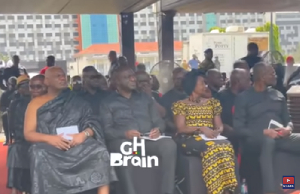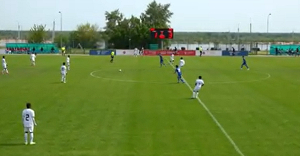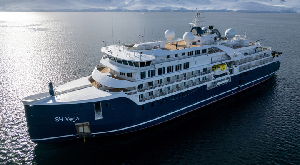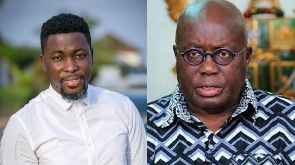Opinions of Wednesday, 2 February 2011
Columnist: Sarfo, Samuel Adjei
The Ewe Heritage Defined (Part Eight)
KOMLA AGBELI GBEDEMAH (1913-98)
EDITED BY Samuel Adjei Sarfo
Komla Agbeli Gbedemah was one of the ten political figures whose life and work spanned the country’s political history of the last five decades. He was instrumental in the formation of the CYO, the Youth wing of the UGCC and later became one of the pioneering figures in the Convention People’s Party (CPP). As one of the most erudite and gifted organizers, his organizational skills made it possible for the CPP to win the 1951 elections in spite of the fact that its leader, Kwame Nkrumah, was behind bars. He became the first Finance Minister of Ghana.
K.A. Gbedemah was born on June 17, 1913, at Warri, Nigeria, where his father worked as a government pharmacist. He was the eldest of six children born by Emma Dey to Awumee Gbedemah of Anyako. At the age of three years , his father retired to the Gold Coast. Gbedemah was later sent to live with his grandmother at Keta where he began schooling at the Local Roman Catholic School. In 1923, he came to Accra to live with his uncle, Carl Dey, who was a member at the Government Teacher’s Training College, Accra. In 1925 his father sent him to SPG Grammar School. On wining the King Edward XII open memorial scholarship, he entered Achimota with the aim of becoming a medical doctor. He completed his intermediate B.Sc at Achimota with William Ofori Atta, Edward Akuffo, among others.
While waiting for his results, Gbedemah, with the help of his father, got employed as proof reader and editor of Times of West Africa owned by Dr J.B Danquah. He left the chalk and books for full-time timber business.
He sold his timber to contactors who were building the Accra Airport and 37 Military hospitals and to H.E. B Greene, a private European building firm.
As his timber business prospered he branched into road transport and at the same time supplied sand and stone to Germans who were building the Accra Sports Stadium.
In 1941, he married Adelaide Plange and he might have forever settled down to a silent successful business life, but the February 28, 1948, Cross Roads Shooting Incident and the events that followed were to change his life altogether.
Around that period, Kwame Nkrumah, whom he had long known at Achimota College, had returned from Britain and was working, relentlessly for self-rule as Secretary General of the UGCC. When the Youth study group of the UGCC was formed, Gbedemah, with whom Nkrumah was then working at Accra Evening News, became an active member. When the UGCC removed Nkrumah from the post of Secretary-General, Gbedemah was invited to take over the post but he declined the offer.
At the crucial meeting held at Tarkwa in May 1949 to decide whether Nkrumah should break away from the UGCC, he was among the first of CYO activists who requested Nkrumah’s immediate resignation and the transformation of the CYO into a political party. When CPP was launched at Arena, Accra, on June 12, 1949, Gbedemah became Vice to Nkrumah who was the Chairman. The declaration of Positive Action in January 1950 nearly killed the young party as all the leading members of the party including Nkrumah were thrown into jail. Gbedemah served four and half months in prison at the James Fort Prison. It was Gbedemah’s natural gift in organization and innovation that saved the CPP from dying at birth. His ingenuity was revealed when he invented the “PG (Prison Graduate) Cap” as a distinguishing symbol in the Gold Coast politics.
The popularity which the “PG Cap” gained made Gbedemah realize the possibility of making heroes out of the party leaders still languishing in jail. The Coussey Committee which deliberated on the Watson Committee Report recommended the institution of a new Legislative Assembly for the nation. General Elections were to be held to fill the Seats. Nkrumah stood for the Accra Central seat while Gbedemah stood for Keta seat. The two won. It was Gbedemah who escorted Nkrumah from James Fort Prison through the vast throng of people who greeted him on his release.
When the first CPP Government was formed, Gbedemah was made a Cabinet Minister for Health and Labour.
According to Gbedemah, it was during his tenure in that Ministry that the idea of extension to the Korle Bu Hospital was first conceived. He also opened the first Health Clinic in Accra near the Palladium Cinema Hall in 1952. His next portfolio was Ministry for Commerce and Industry from 1952 to 1954. In this position, he set the foundation for the Gold Coast industrialization.
It was also Gbedemah together with Botsio, who flew to London in 1957 to hold last minute discussions with the British Foreign Minister before Ghana was granted Independence on March 6, 1957. While Minister for Finance, Gbedemah also succeeded in convincing the International Monetary Fund that the increasing number of African countries joining the Fund justified the formation of an African Department headed by and African.
Gbedemah’s conservative approach and his general right-wing political views as against Nkrumah’s radical views were to result in conflict between the two personalities. In the end Gbedemah was forced into exile.
Gbedemah returned to Ghana on June 16, 1966, 114 days after the overthrow of Nkrumah and his CPP government. At home he wanted to team up with his exiled friend, Busia, to form a party to contest the 1969 elections but this fell through. He later on founded his own party, the National Alliance of Liberals (NAL) and became its leader. With the rising sun as symbol, Gbedemah moved the length and breadth of the country with campaign messages.
On the platform, he was a real wonder as he effectively delivered his campaign messages in Ewe, Twi, Fante, Ga and Hausa which he spoke with equal eloquence. When the final results came he had only 30.44% of the votes.
Gbedemah himself won a seat in Parliament. He entered Parliament as a member for Keta Constituency after the general elections. He was later disqualified from parliament by virtue of Article 71 of the 1961 Constitution.
In January 1972, the PP Government of the Prime Minister Busia was overthrow and Gbedemah was appointed Ambassador Plenipotentiary from April to June 1972. When the ban on party political activities was eventually lifted in 1978, his attempt to get involved in politics was frustrated by disqualification clauses.
With the ban on politics lifted, Gbedemah tried to become a kind of godfather and kingmaker for the Nkrumaist group which had been split into factions. Gbedemah said he entered politics with a definitive aim of putting truth, honesty and justice in the forefront of everything.
Komla Agbeli Gbedemah died on Saturday July 11, 1998 at the ripe age of 85.
SOURCE: WIKIPEDIA












